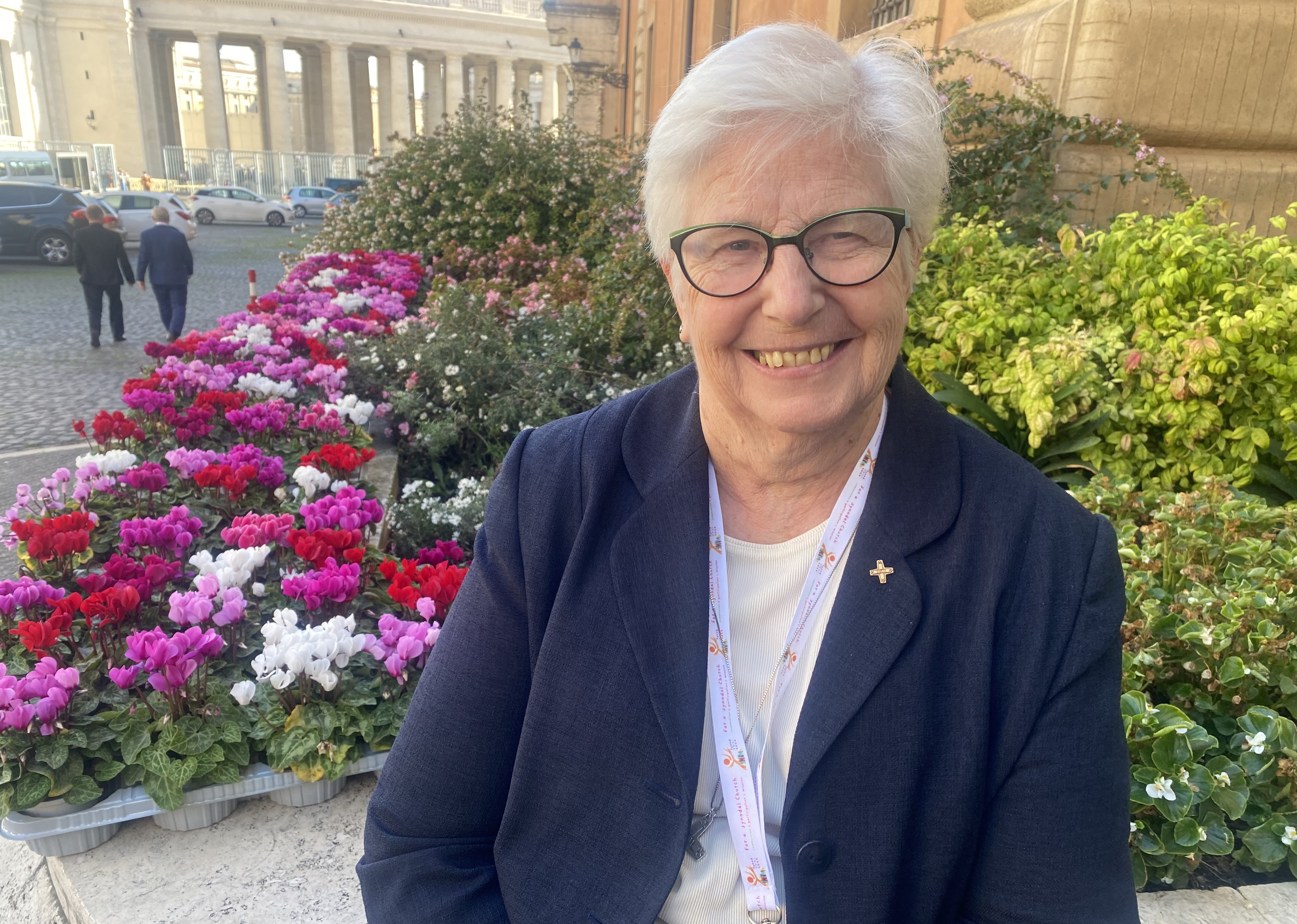
Loreto Sr. Patricia Murray, executive secretary of the International Union of Superiors General, waits outside Paul VI Hall at the Vatican before the start of the synod on Oct. 4. Murray said the listening emphasized at the synod, shifts "the feeling that the truth resides at the top of the hierarchy" in any church structure. (GSR photo/ Rhina Guidos)
Listening is a key word at the synod, but it's also a way to "shift the feeling that the truth resides at the top of the hierarchy" in any church structure, said Sr. Patricia Murray, just before the start of the first session of the Synod of Bishops on Oct. 4.
Murray, a leader of the Rome-based umbrella group representing Catholic sisters across the world and one of about 40 sisters taking part in the Synod, said: "We're saying the truth resides in the body [of the church]. We listen to the body."
"Now, those who have responsibility in the church and in religious congregations, having listened, then are better informed to take a decision in the Holy Spirit," Murray, executive secretary of the International Union of Superiors General, or UISG, told Global Sisters Report.
Don't count on the synod's monthlong focus on listening as a one-time event or one that will stay in Rome, said Murray, adding that the process may become "a new way of life, a new way of leading" the church and its organizations.
"When we're discussing things or looking at important issues, we often we leap right into the business, if you like, without listening to one another, listening to the word of God," said Murray, a member of the Institute of the Blessed Virgin Mary also known as the Loreto Sisters. "However, this is a way of really going a bit deeper, much deeper, as a Christian community gathered, and to listen to what's moving in the hearts of people."
UISG already has started a process trying to inculcate that "new way" to follow among religious communities that the organization serves globally, she said, with introductory sessions in multiple languages via Zoom before the synod that will continue for the next three years.
"What does it look like? It will look like formation, understanding what synodality means, because there's a lot of confusion about the term," Murray told GSR. "It's a way of really deep listening to God's Spirit in leading us, whether at a personal level or at group level."
If the first day of the synod is any indication, it involves some reflection, a little bit of music, some quiet time, prayer, silence and listening — to oneself and others. And it offers a glimpse at what synod members like Murray are experiencing this month.
"We're searching for guidance of the Holy Spirit, so in a sense, often we begin a meeting and we pray for guidance to the Holy Spirit. However, this is a way of really going a bit deeper, much deeper, as the Christian community gathered, and to listen to what's moving in the hearts of people," she told GSR.
Murray is one of five UISG members participating in the synod, which includes the organization's newly appointed president, Sr. Mary Barron, of the Congregation of the Sisters of Our Lady of Apostles; Mercy Sr. Elizabeth Mary Davis; Sr. Elysée Izerimana, of the Working Sisters of the Holy House of Nazareth, and; Sr. Maria Nirmalini, a member of the Sisters of the Apostolic Carmel.
Advertisement
While listening and praying already are prevalent in religious communities, the synod's process offers a slightly different style, one similar to the process of discernment posed by St. Ignatius of Loyola, Murray said.
"There are other spiritualities that have other ways of discerning, but one way is to name what is moving within you? Where do you feel God is calling? Where is the Spirit calling me personally at this time? We share around the circle," she said.
"Then in the second round, we say: 'What have I heard my brothers and sisters saying that really has struck me or touched me, moved me?' Then we share that again without discussing. It's deep listening. It's listening to God speaking to each one of us, because that's what we're saying, it's our baptismal authority, that God speaks to each person. The task is to listen."
Following that step, there is a "third round," she said.
"We begin to say, 'Now, what's been said to us here?' It's a much more free-flowing, open discussion, but having listened deeply. So often, we get into a … debating mode in meetings, whereas this is inviting us to a deeper way of listening."
And it's a process that can be implemented at any level in the universal church, Murray said, but for the purpose of UISG's members, it means introducing leadership in religious congregations and those leading provinces to a new path.
"It's learning to be much more attentive. It's a practice, it's a spiritual practice," she said.







